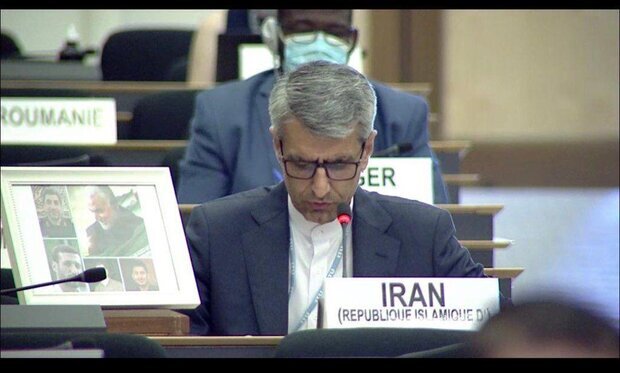TEHRAN — Esmaeil Baghaei Hamaneh, Iran’s ambassador and permanent representative to the UN office in Geneva, has condemned the U.S. assassination of top Iranian general Qassem Soleimani as an act of state terrorism that has endangered world peace and security.
Addressing a regular session of the UN Human Rights Council on Thursday, Baghaei Hamaneh described the assassination as an “illegal measure” and a “big crime”.
He said the U.S. and the country that hosted the American drones used in the killing of General Soleimani must be held accountable for the atrocity, Tasnim reported.
The U.S. action was a violation of the international law, the UN Charter, and the humanitarian law, the Iranian envoy said, adding that the assassination was an immoral and dangerous action.
Washington must not be allowed to justify such illegal measure under any pretext, Baghaei Hamaneh stated.
He then called on the UN Human Rights Council to raise the alarm at the threat to the fundamentals of human rights, rule of law, and international principles.
On January 3, U.S. President Donald Trump ordered strikes that killed General Soleimani, chief of the IRGC Quds Force, and Abu Mahdi al-Muhandis, the second-in-command of Iraq’s Popular Mobilization Units (PMU), as well as eight other people.
Iranian Foreign Minister Mohammad Javad Zarif has said Trump was misled to believe his country would get away with the assassination of General Soleimani.
Trump believed that the assassination would augment U.S. security but it worked the other way around, Zarif said in an interview with NBC News’ Richard Engel in Munich back in February.
On Monday, Agnes Callamard, the UN special rapporteur on extrajudicial, summary, or arbitrary executions, said that the assassination represented a “violation of the UN Charter”.
The United States has failed to provide sufficient evidence of an ongoing or imminent attack against its interests to justify the strike on Soleimani’s convoy as it left Baghdad airport, said Callamard.
She also presented her findings on Thursday to the UN Human Rights Council in Geneva, in which she said the U.S. measure constituted an “arbitrary killing” for which the United States is responsible under international human rights law (IHRL).
Callamard said the United States had provided no specific evidence that showed Soleimani was planning an imminent attack against U.S. interests, particularly in Iraq, for which immediate action was necessary and would have been justified.
Later on Thursday, U.S. Secretary of State Mike Pompeo defended the assassination, claiming the strike “was undertaken in the exercise of the United States' inherent right of self-defense.”
In retaliation for the assassination of General Soleimani, who headed the IRGC Quds Force, an Iranian ballistic-missile strike on January 8 targeted a U.S. base in Iraq housing U.S. forces, leaving some 110 U.S. troops suffering from traumatic brain injuries.
TAGS


No comments:
Post a Comment